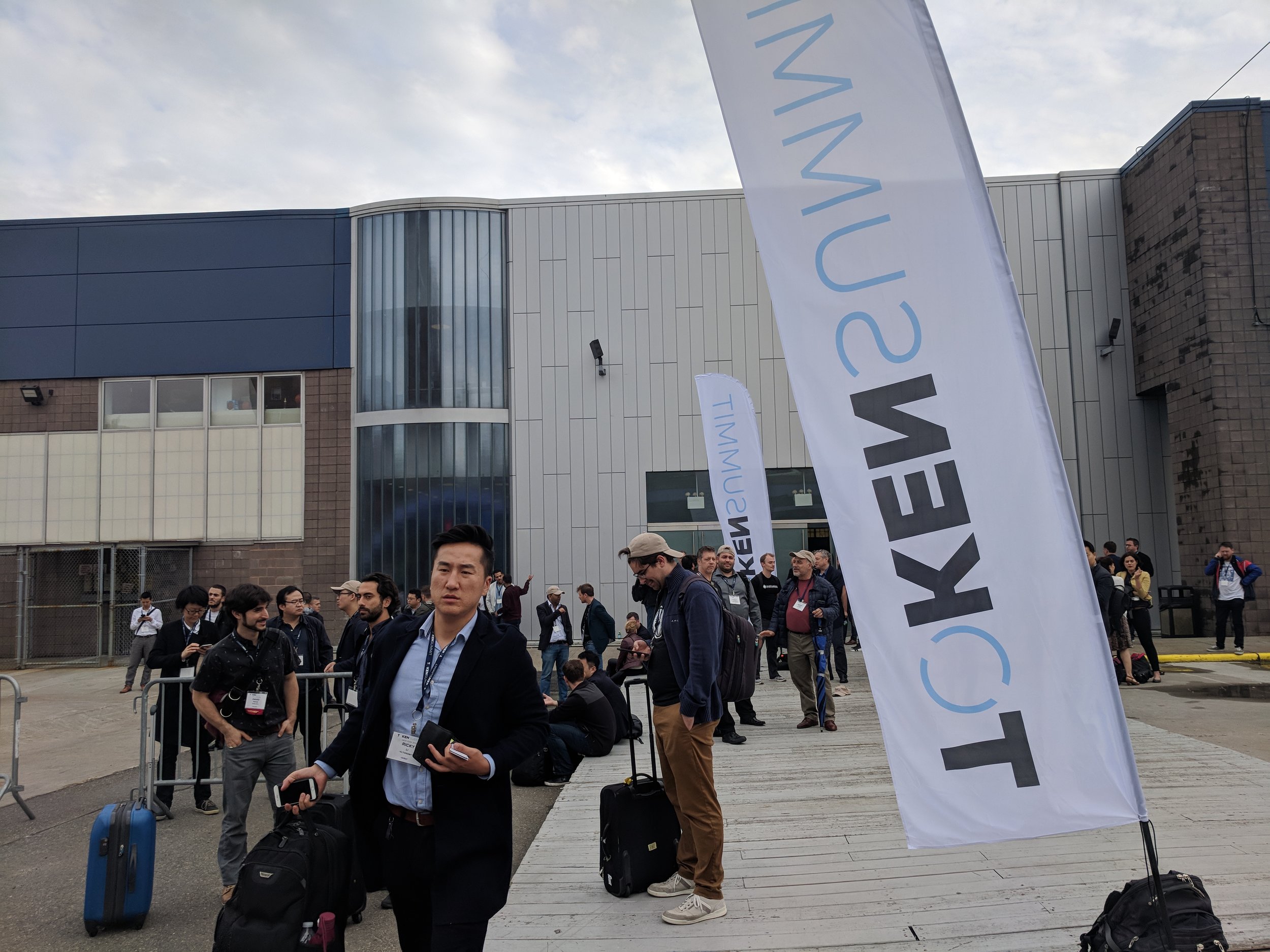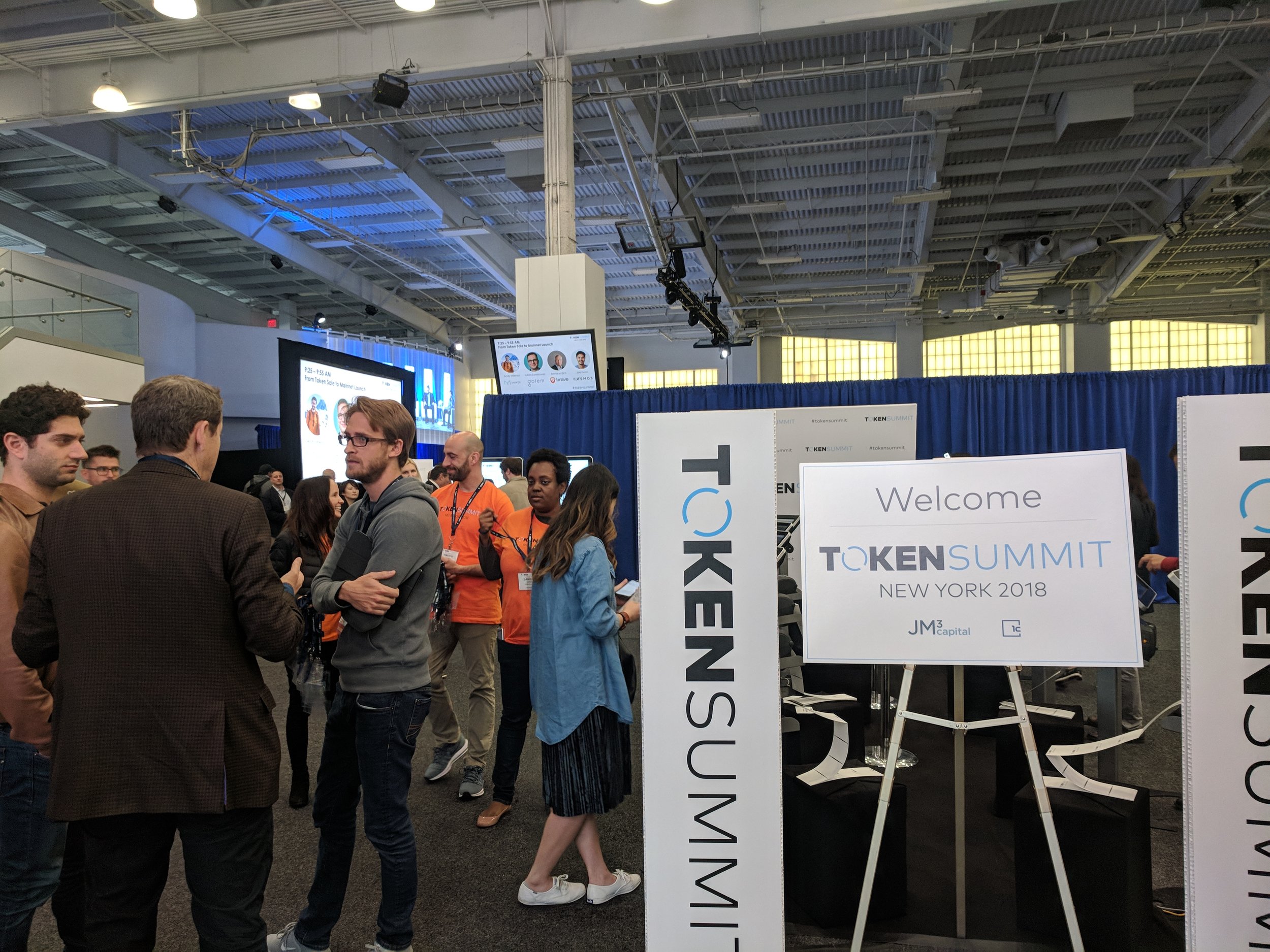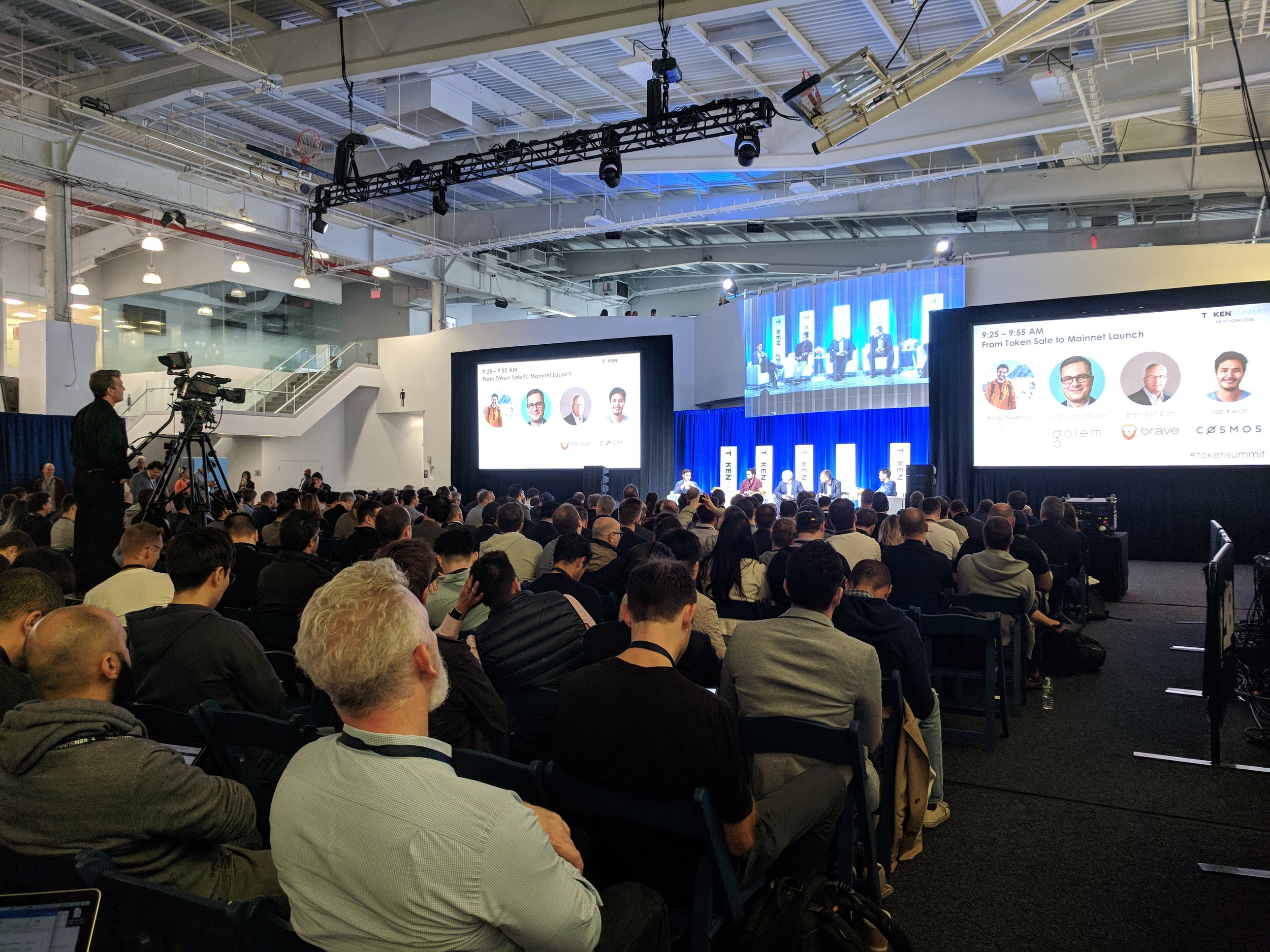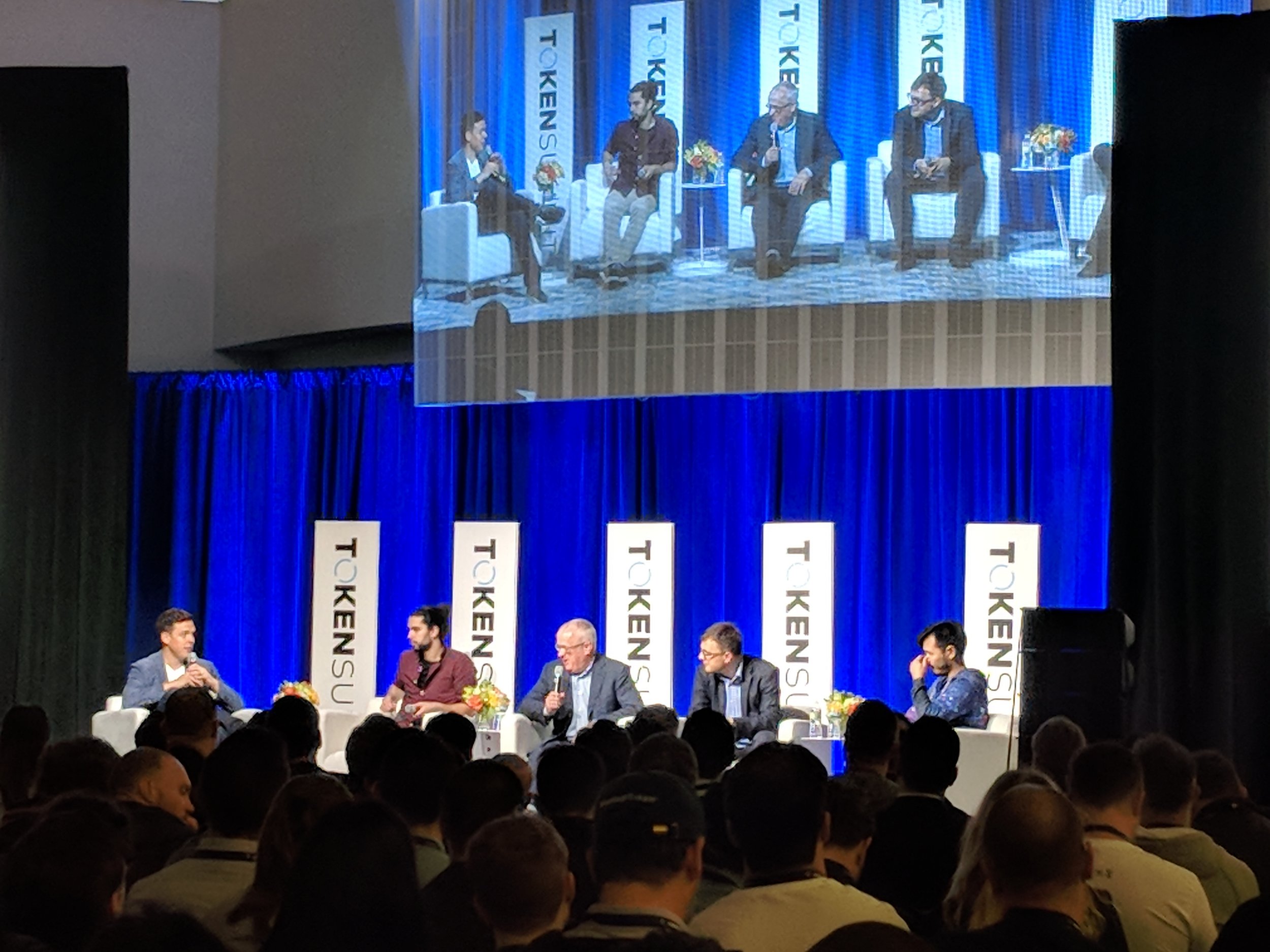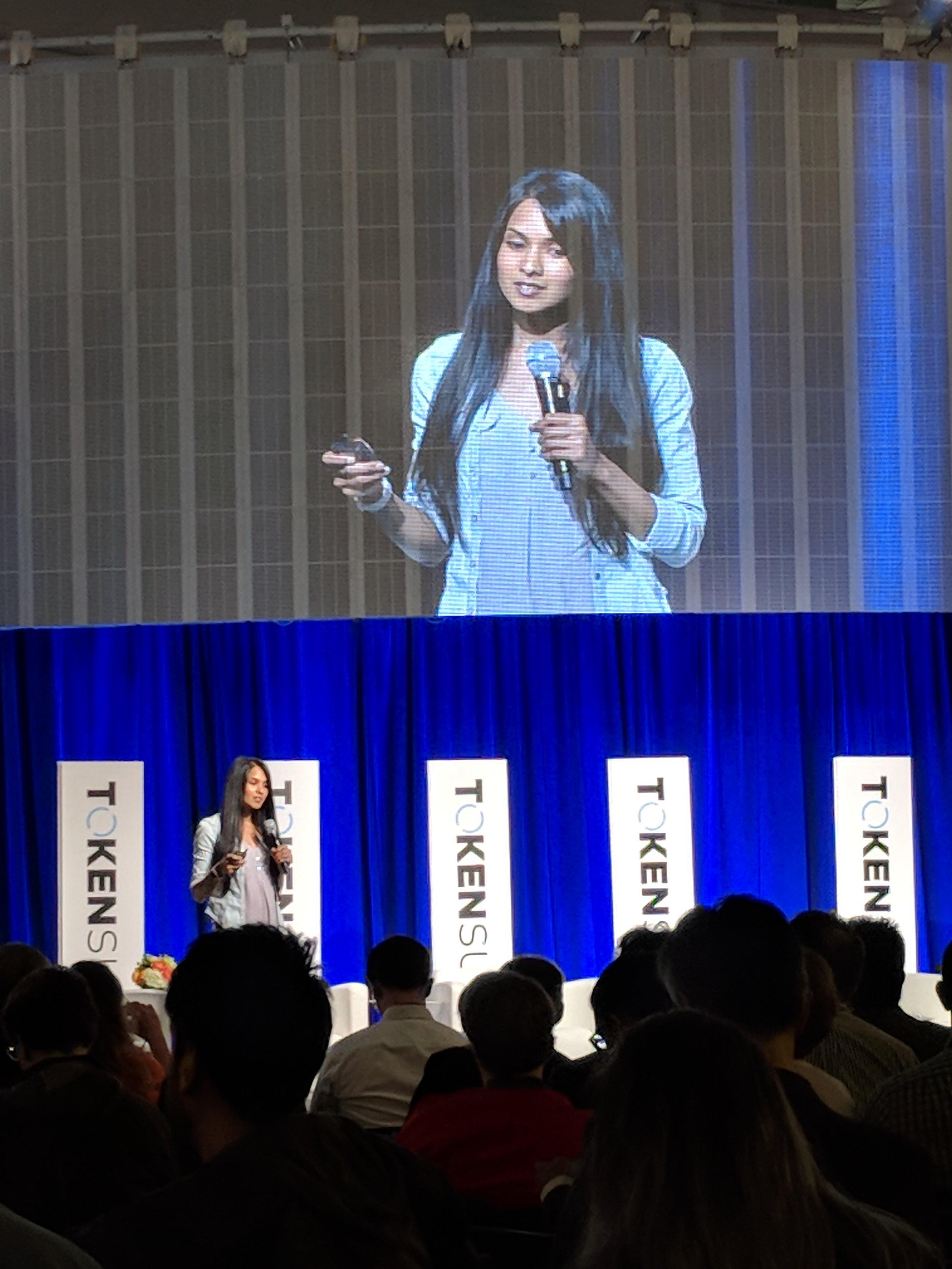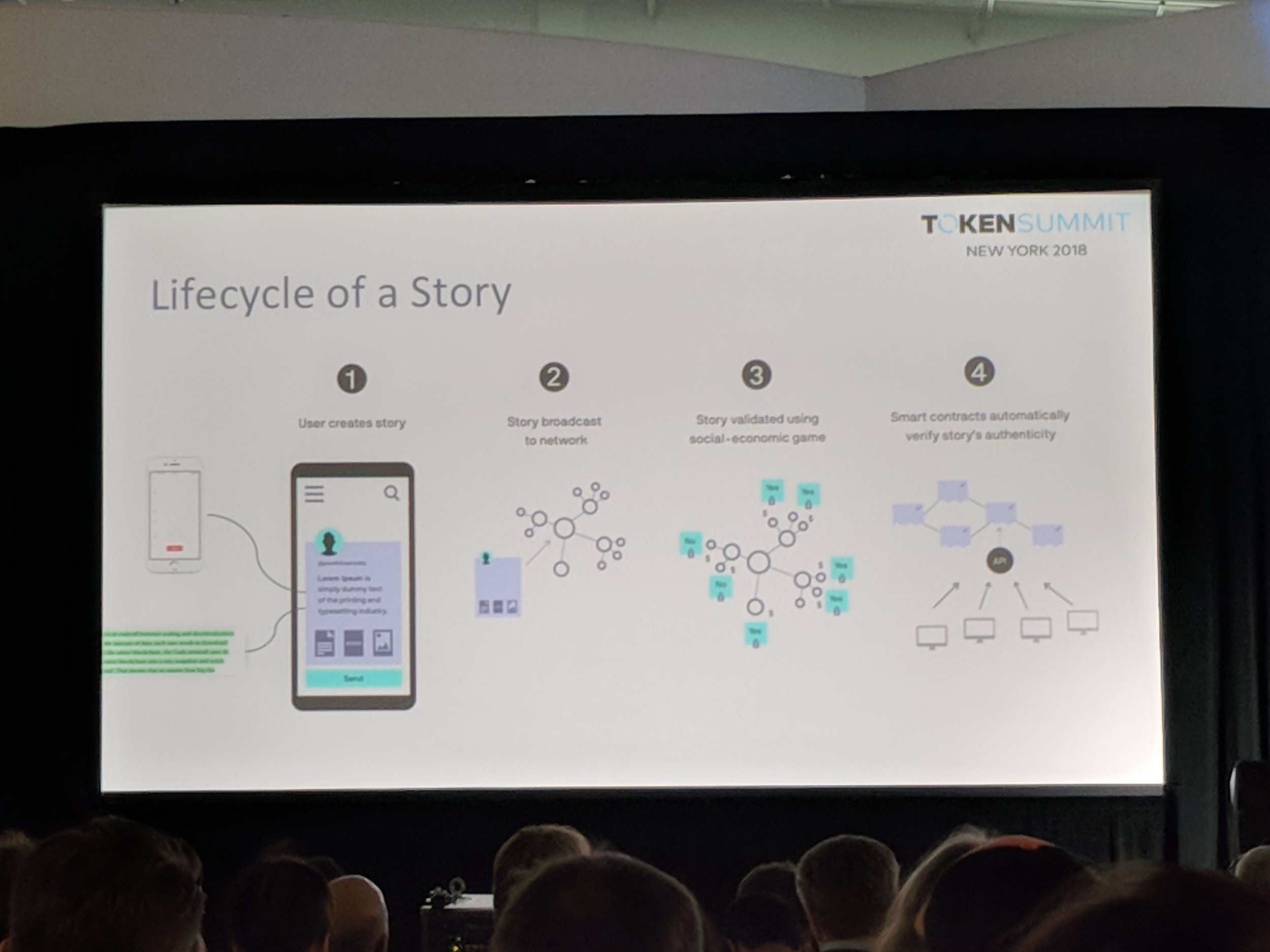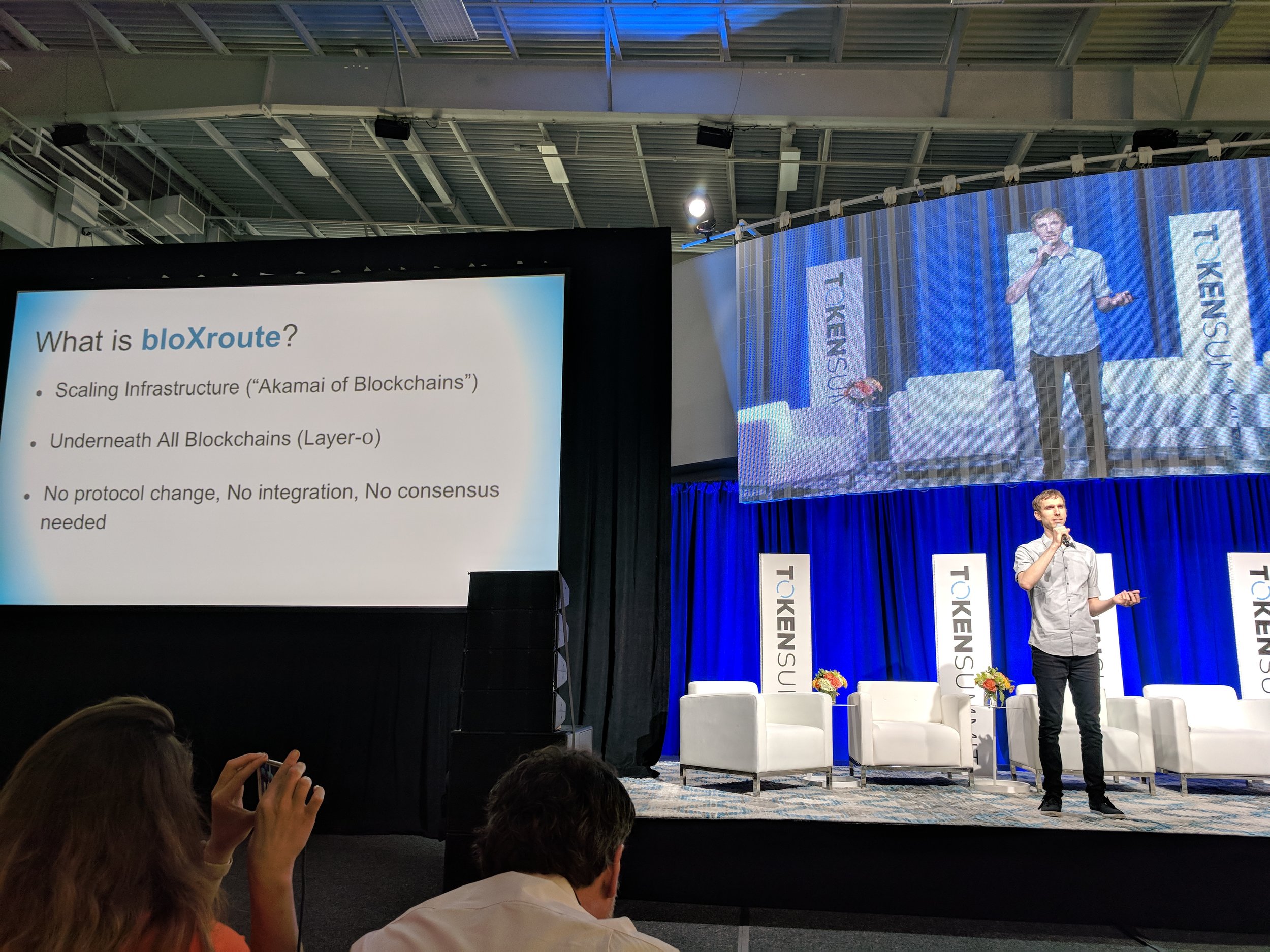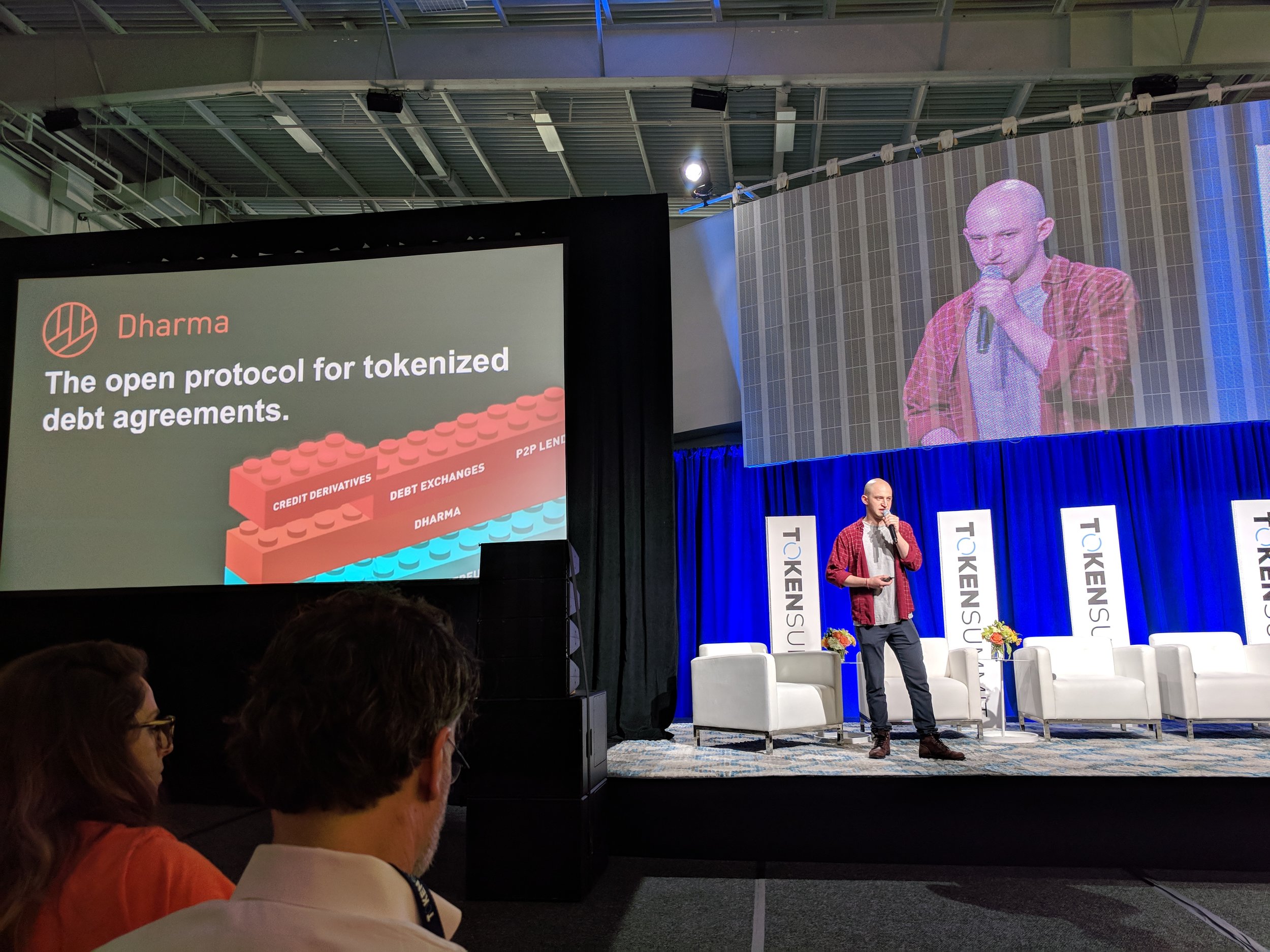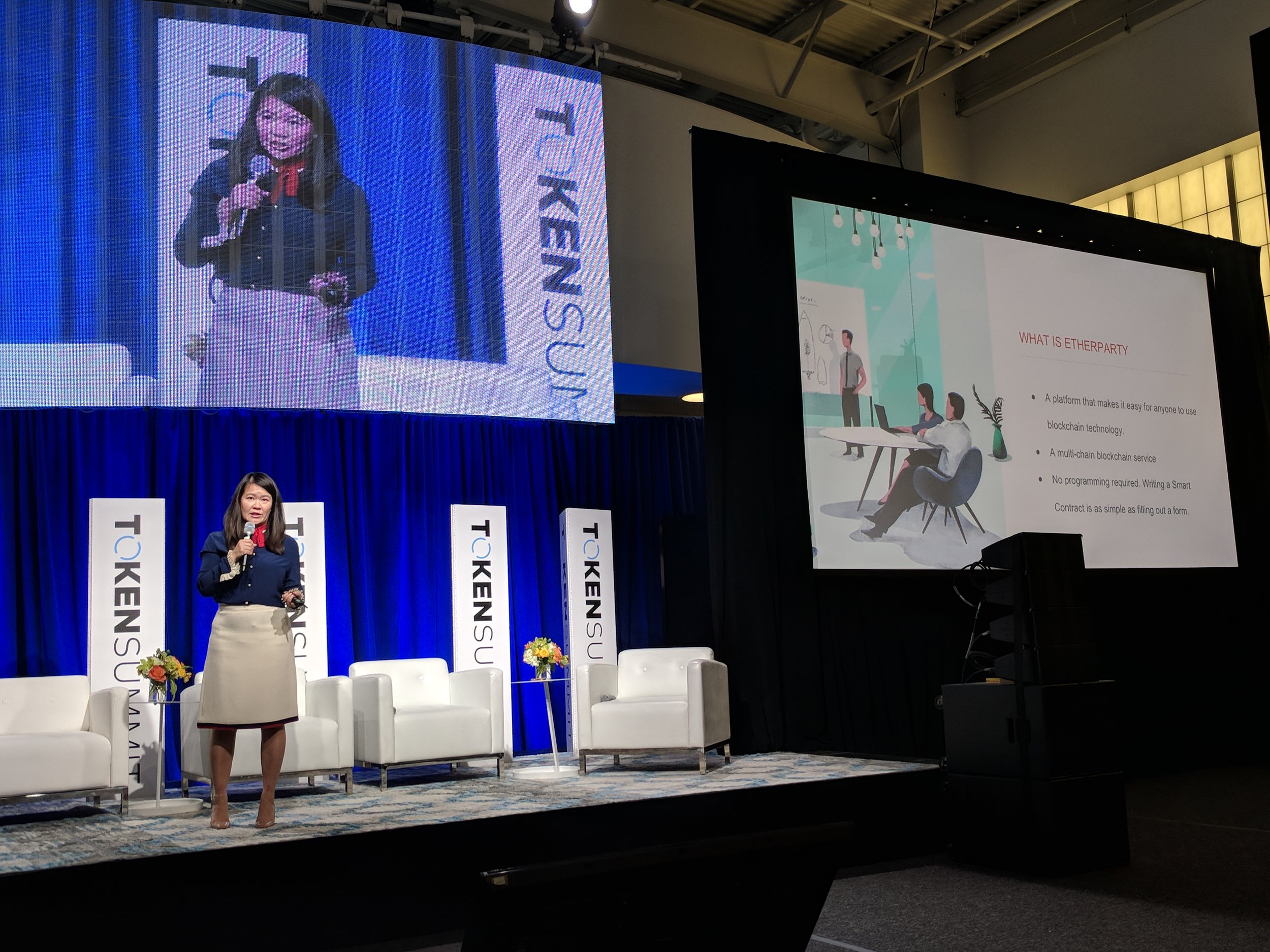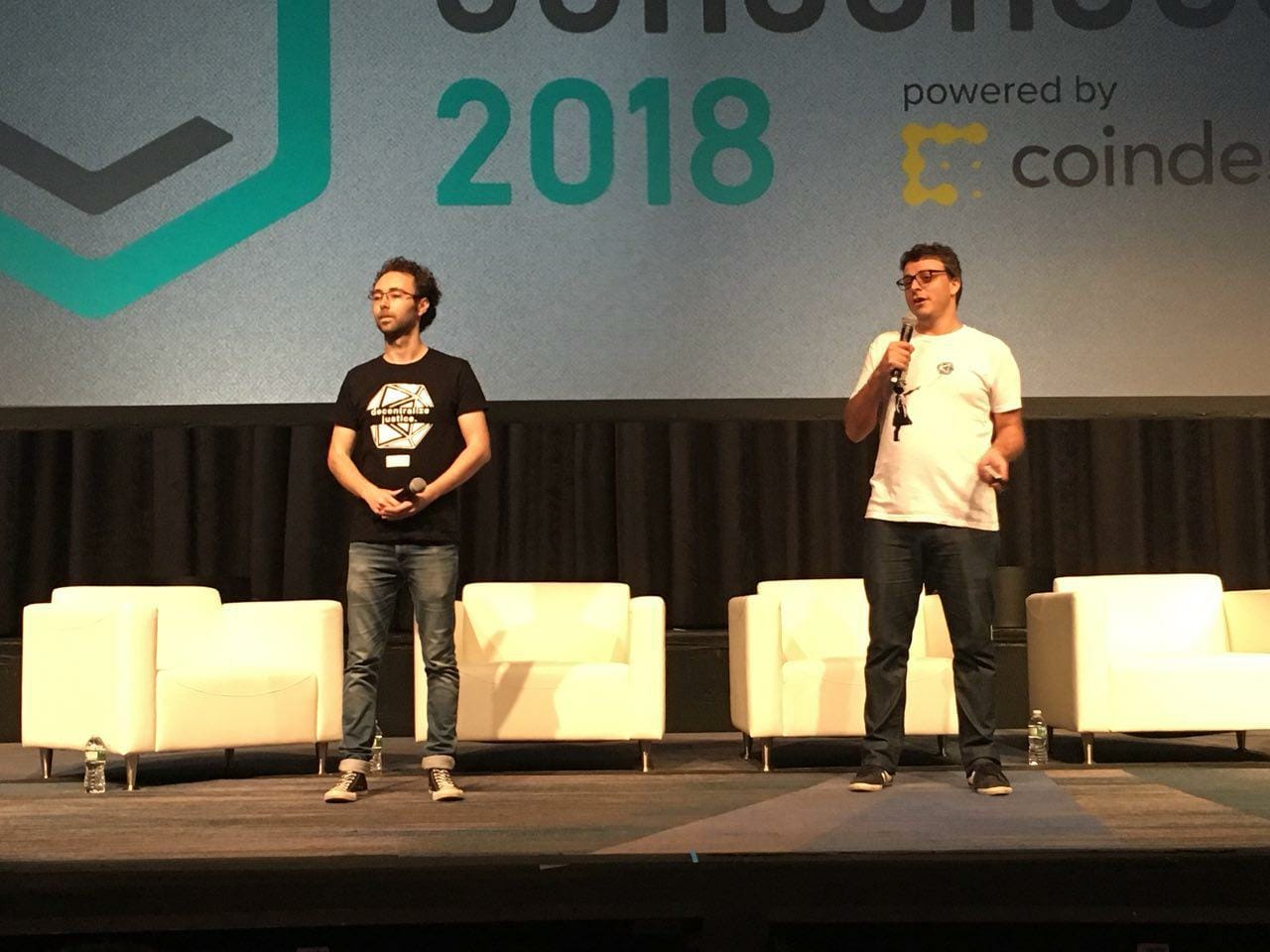Token Summit III - NY Blockchain Week
Token Summit III - May 17, 2018
Token Summit III is the 3rd event in a series created by William Mougayar and Nick Tomaino, exploring the quickly developing token economy. It was part of the massive New York Blockchain Week, that kicked off with Ethereal, continued with Consensus, continued further with Token Summit, not to mention the plethora of other conferences, meetups, evening events, and parties. These are some of the blockchain events that happened during NY Blockchain Week.
The final agenda featured 53 speakers, 7 Fireside chats, 7 panels, and 16 Show and Tells. In addition to the actual conference, Token Summit partnered with Coinlist to offer free legal office hours for token sales. Additionally, attendees who wanted to insure their flights with Etherisc were able to do so with no premium.
More photos from the event are available here: http://beatricemoritz.zenfolio.com/051718b
Video sessions have also just been posted to YouTube!
Main Agenda
Doors for registration and continental breakfast opened at 7:30am. As well all know in blockchain world, that is super early - especially with blockchain week parties! So I was a bit delayed but managed to catch most of the day.
8:30am - Opening Welcome
8:35am - Tech and Regulation from Paypal to Ethereum. David Sacks (Paypal, Harbor, Craft Ventures)
8:55am - Security Tokens. Josh Stein (Harbor), Andy Bromberg (Coinlist), Stan Miroshnik (Element Group), Anthony Pompliano (Morgan Creek)
9:25am - From Token Sale to Mainnet Launch. Andy Milenius (Maker), Julian Zawistowski (Golem), Brendan Eich (Brave), Jae Kwon (Cosmos)
Token Regulation in the US - 9:55-10:25am
Nancy Wojtas, Cooley. Brad Brunham, Union Square Ventures. Lowell Ness, Perkins Coie. Lilya Tessler, McDermott Will & Emery. Moderator: William Mougayar
For what it's worth, William said this is his favorite panel. Law and regulation is of the utmost importance in this field that is developing rapidly, so that makes sense.
Security, Utility, Liquidity
Brad: How do you handle a secondary market? At some point, you will need liquidity.
Lowell: Allow people to use tokens for their intended purpose – utility.
Nancy: My wish is that the SEC would focus on the fraud cases. But the SEC’s point that disclosure takes care of everything, that’s not true. I was a former staffer at the SEC. In the dot com boom, we had all the disclosure but that didn’t stop the chaos in 2002, didn’t stop 2008, so disclosure only is not the answer. My recommendation - come in with a lighter touch regulation agency. You also have to know what’s going on in other countries.
We have 5 agencies we have to worry about – there’s the CFTC, FTC, FinCen, 50 states, etc – a very fragmented regulatory system. Would like it under 1 smart agency.
The SEC comes out with a box, and you have to fit into it. They don’t have the answers at this point. We are trying to guide them. SEC sounded fairly open-minded in our conversations with them (other than the chairman, who thinks everything is a security). They don’t want innovation to go elsewhere.
Lilya: Under current securities law, every time there is movement between 2 parties p2p, that’s a security transaction. You have to be registered as broker/dealer – all the laws apply, and it’s not feasible to do so for blockchain companies. Digital Asset Exchanges are different.
Brad: Tactical advice for those doing token sales?
Lilya: The industry is coming up with a lot of self-regulatory best practices. Good example is KYC/AML.
Lowell: Nancy’s idea of an agency is a good one but it would take a long time. It's perfectly ok using the existing regulatory regime, but we have to get it right. A token could start out as a security and then have the status change over time. That could be a good model – sell to accredited at first. You could raise the money you need to build your system using the traditional process, then use the time to build out the functionality.
Brad: Assume development moves faster than the SEC. Suppose you have a protocol ready to go, and want to release the software to the wild. Pretty much everyone has acknowledged that Bitcoin is not a security – the main reason is there is no promoter exercising control, Satoshi doesn’t come out to do this. If you are pre-mining 80% of tokens, you’re going to be looked at very carefully. If you make sure more tokens are in the hands of users and creators on your network, you will be in a safer spot.
Nancy: An airdrop may be considered distribution of a security. If you are fully functional, you sit down with the SEC and you tell them all the facts, how the token will work, and hear about how they view full functionality. We are not anticipating that the SEC will provide written guidance. We see projects with schemes to try to get around US regulation – forbid US investors, do token sale in another country. That’s not the end. If you have 1 US investor and that investor complains, the SEC could open an investigation. These are not inexpensive things to go through. Being involved in an investigation is like being in hell without dying. Until the space is further developed, you have to be very sensitive as to what steps you take.
Next 6 Months Outlook
William: What do you hope to see in the next 6 months?
Lilya: More clarity and good use cases. SEC provide limited relief for good projects.
Lowell: Clarity around full functionality.
Brad: Other jurisdictions around the world offering clear rules, putting pressure on US.
Nancy: Nothing will change in the next 6 months.
Legal experts discussing Token Regulation in the US
Show and Tell Session - 16 Through the Day
16 different projects had the opportunity to share their work in a few minutes at Token Summit.
Trustory
- What - Platform for users to discover content.
- Why - Have seen people make all sorts of false claims and raise a lot of money on it. There is no central org to provide veracity of information.
- Collective knowledge on the cloud.
- Validation using social-economic games. Voting based. Vote to stake, reputation weighted. Honest voters are incentivized and dishonest punished.
Oscoin
- OSS is public infrastructure.
- Why - Incentivize maintainers. Developers like to code. Maintaining has more responsibilities besides coding.
- 93% of npm packages only have 1 maintainer!
- Community owned and operated network for OSS collaboration.
Incentivize Open Source Software Maintainers
Bitbond
- Finances SMEs worldwide. Lending using alternative data sources - analyze automatically using ML algo.
- Use Bitcoin as a payment method.
- Originated over 2600 loans.
- Regulated German BaFin license since 2016.
- Onboarded institutional investors to fund loans.
- ICO in July 2018.
- Security token with security prospectus, Ethereum-based token.
Bitbond lending platform
Gibraltar and Tokens - 11:05-11:25am
Albert Isola, Gibraltar Ministry of Commerce. Joey Garcia, Isolas LLP. Moderator: William Mougayar
History of Crypto in Gibraltar
Initially it was not a great outlook. 3 papers were written on should we get involved in the space? What should regulation look like? Legislation was published in October 2017, effective January 1. 30 firms applied for regulator licensing, another 30 waiting now.
We have a simple philosophy - like when we were the first jurisdiction to welcome online gambling firms - it's about consumer protection and longevity. We want quality operators who want clear regulation. We are looking at token regulations as enabling longevity of the industry.
How to Attract Entrepreneurs
William: How do you attract entrepreneurs and companies or listing on GBX?
Albert : By creating the framework, we welcome those who want to comply. GBX is the Gibraltar block exchange. We are trying to set the right sort of standards.
Joey: We like the idea of regulatory arbitrage. People not so much looking to avoid regulation, but looking for clear rules/appropriate framework and to comply with those.
Albert: You can’t regulate blockchain the same way you regulate financial services. One of the nice things about small jurisdictions is you can sit down and have a chat with a regulator. You can move quickly as a smaller jurisdiction too, however to do things properly, it takes time. Need a deep level of understanding.
Joey : We are regulating counterparties, not technology. Our regulators are very supportive of building these industries.
Gibraltar Vs Other Jurisdictions
William : What about Liechtenstein, Malta, Caymans?
Albert : Everyone has a different way of doing things- this is good, competition is healthy. We are not threatened. We want to attract higher quality firms that want to be regulated. By being one of the first jurisdictions to move, we have built good relationships.
Joey: We have been working on this for 3.5 years, so not just reacting.
Albert: We don’t pretend to have all the answers. Engage with us if you think there is something we could be doing better. Preserve and protect token issuance – great way to allow new ideas to come to the fore.
Status and Outcomes
William: How are the outcomes so far?
Albert : Regulators need more resources/people. Things are looking extremely good. We want people on the ground that can be regulated - real offices with real people coming to Gibraltar.
Joey: We provide regulation certainty, tax certainty. Having a certain amount of wealth is not necessarily the best way to decide if an investor is educated (like the US accredited investor system).
William Mougayar interviewing Albert Isola and Joey Garcia of Gibraltar
Beyond Coinbase.com : Coinbase's New Product Expansion - 11:25-11:50am
Siddharth Coelho-Prabhu, Toshi. Reuben Bramanathan, Index Products. Connie Yang, Design. Sam McIngvale, Custody. Moderator: Nick Tomaino
Nick, formerly of Coinbase interviews current Coinbase leaders about new products and relevant trends, with each speaker discussing their area of expertise.
Sam: There are issues with securities and non-securities, we talk to/educate regulators regularly. There are network effects in custody. Regarding crypto hedge funds – their LPs understand the place of Coinbase in the ecosystem.
Connie: Some people want very simple and we control keys for them, some people want to manage their own. We add in “benevolent friction” - notes that say if you don’t write your seed, for instance, you may lose your funds.
Reuben: It's a challenge to go from a single product consumer-facing company to 8 products and counting, and we need to have a cultural shift. Creating more nimble startups within Coinbase, supported by core functions of Coinbase.
Siddharth: The org structure of Toshi = acquired Cypher Browser. We are a team of 2 plus the support of an external agency, which is working really well. We're very entrepreneurial, and we consult with execs and the board but product leads have power to make the decisions they think are right for the customer and product strategy.
Connie: We had 3 designers 8 months ago, now 12. Keeping consistency is hard.
Sam: We're moving fast internally, startups within startups. We have almost unlimited resources and smart people so we're set up very well.
Siddharth: We're building platform for developers now. Today we’re at almost 50 dapps from the original CryptoKitties. There are thousands of devs in Ethereum communities. CryptoKitties/collectibles, decentralized exchanges are the ones most used on Toshi. A 3rd space emerging is decentralized social media.
Reuben: Coinbase Asset Management is solving the paradox of choice for people starting in crypto. The first fund is institutional focused, but we will have funds available to retail investors too.
Sam: The measurement of business success is AUM. We're hoping to reach 98-99% of the crypto market cap (currently there are only 4 coins available on Coinbase). Our custody solution offers key insider threat mitigation. Puts in place processes/technologies such that no person or small group can move assets out. Regulated and audited solution. Bring in big name auditors.
Competition
Nick: What do you think of the competition?
Sidhharth: Our biggest competition is Metamask- they operate on web and we operate on mobile, but they have great mindshare. We created the category with an app wallet, need something secure AND user friendly. Status is getting closer and closer to launching.
Reuben: We'll have to anticipate more smart-contract based index funds.
Sam: Xapo, Bitgo, Kingdom Trust, Ledger Vault, Anchor. Enough room for multiple winners. We are behind on a number of metrics with a later start in the space and are keeping an eye on that.
Looking Forward
Nick: What are you excited about?
Siddharth: Can’t wait to see what kind of applications people build, excited to be gateway to those experiences.
Reuben: Mainstream adoption, education and making it clear to users why it’s important. Ssing design to abstract away complicated parts, education, most excited by Toshi.
Connie: The biggest roadblock is how to get started, access to education and making sure people can join.
Coinbase - Past, Present, and Future
A Tale of Two Tokens - 1:30-1:45pm
Matthew Roszak, Bloq. Steven Waterhouse, Orchid. Moderator: William Mougayar
The Two Tokens
William: What is Orchid?
Steven: Access to information around the world is censored and surveilled. Give people the choice whether people want to be censored and surveilled. Now we are offering bandwidth, storage, and compute- offering developers ways to build. There are about 400 million people in China and they are not able to access the information we are.
William: Will Orchid allow Chinese to go around the Chinese firewall and express themselves?
Steven: Yes potentially. There are many places around the world that need this, not just China. We’ve seen even here concerns with social networks and how they’re sharing our information.
Matthew: Metronome's crypto launch dat is June 18, start of descending price auction. It is a new autonomous money layer. Once launched, nobody involved can change it. Going forward, autonomous networks will be the most powerful part of the new internet. Born on Ethereum but has cross-chain portability built in. Think of it like Metronome is the box car and the chains are different rails. You can switch the box car to whichever rail you want. New concept in crypto = self-governance. A whitepaper isn’t a whitepaper, it’s an owner’s manual. Fairness = everyone starts on June 18, A16z same as a soccer mom in Brazil. The sale of Metronome tokens is via smart contract.
William: What are the use cases?
Matthew: Store of value, payments, ultimately when you have an autonomous money layer -> payment programming vs payment processing.
Best Practices for Tokens
William: What are best practices for tokens?
Matthew: We want to put out best practices and frameworks. Disclosures, lock-ups. Founders stake is locked up in code in a token locker, and vests over a 3 year period. Token Alliance (serve as Chairman) works with the Chamber of Commerce. Caring deeply about this space, we need to spend time with regulators. Token Alliance is putting out a whitepaper in the next several weeks setting out best practices – written by 20 law firms, 300 crypto projects. It's a living document on Github open source.
Steven: We’ll be launching our mainnet in October, testnet this summer. We're working significantly with business partners and developers for access and communication.
Discussing Orchid and Metronome
The Asian Crypto Landscape - 1:45-2:10pm
Vansa Chatikavanij, Omise Go. Gordon Chen, Neutral. Jason Fang, SORA Ventures. Zhuling Chen, Aelf. Moderator: Nick Tomaino
Jason: We are based in Hong Kong, have a bit over $100mm AUM. The investment strategy is to incubate dapps in Asia, in US mostly protocols.
Gordon: We work in decentralized financial instruments.
Vansa: OmiseGo works on wallets and payment interoperability.
Asia vs US, Community
Vansa: We are launching the first Ethereum meetup next month in Bangkok. The government is very open to the technology itself. We're registered in Singapore, but a lot of team members sit in Bangkok. Singapore is good for setting things up but operating/labor costs are high comparatively.
Gordon: I spend a lot of time in US. The core community/technology is here. A lot of arbitragers/speculators are everywhere.
Jason: The reason we have 2 strategies is because we do smaller check sizes on US investments, and lead a lot of rounds in Asia. We have to make sure the token structure makes sense for Asia's investment appetite – investors prefer shorter investment cycles and to recycle capital a lot faster. So dapps are much easier to turn and incubate. The culture in Asia is slightly different, so it's easy to incubate celebrity entrepreneurs. We super undervalue the initial offering so it does well in the secondary.
Asia’s investment strategy is about coming in and out fast, making a quick 4-5x, and recycling capital.
Asians like to gamble a lot, it's a cultural thing. Will see more market makers and traders and partnerships between traders and exchanges.
Business relationships matter a lot more in Asia -> get things done quicker there.
Speculation Environment
Nick: Speculation is increasing drastically, what will happen going forward?
Gordon: In terms of tech, we haven’t seen any big tech breakthrough recently. Speculation is getting cooler and cooler, unless we find some new kind of concept.
Zhuling: Underground, there are a lot of entrepreneurs working very hard on blockchain businesses. In China and South Korea, a lot of entrepreneurs have already jumped into this field. A lot of large companies are using blockchain tech. Consumers have been educated already about digital currencies, so it's easy for the migration.
Nick: China has cracked down on crypto. Are people moving to Singapore and Japan? Are serious entrepreneurs staying in China?
Zhuling: Most of our team live in Singapore. Lots of projects are starting to go offshore. Not just to leave China, but for the benefit of regulatory stability in Singapore. The Chinese government issued a restriction last September, but we see that as more a protection for retail investors. As long as you stay a technology company in China, it's totally fine. This is good to force Chinese companies to go global. Traditionally if you are based in China, you're always thinking about the domestic market. If you look at exchanges and projects, now you should think about how to outreach to other markets from Day 1. More distributed and more global.
Vansa: Our community is global, but our starting target market is Asia. We know the landscape and regulators well and are building up capacity now. We just launched Nutrino, a blockchain coworking space in Tokyo. We're also launching one in Singapore. The regulators in Asia are interesting. We went to a meeting recently called APAC. We were pushing government to do a regional sandbox, and they were open to this.
Gordon: The most important thing is trying to hire the most talented people. Go where the talent is. I started an internet company in 2014 in Beijing, an energetic and entrepreneurial city. In the Bay Area, you find all kinds of engineers. There is limited supply of good talent in this market.
Jason: Most of my time is spent in China but I like to work with projects that do a reverse ICO model. The incentive is not to fundraise as much as possible, rather using token/blockchain as a strategy, like with Mithril. Mithril IPO'ed on the NY Stock Exchange.
Vansa: Asia has financial frictions that are more stark than other places. We're starting to look at partners, going to different countries like Vietnam (interesting, not many people are talking about it yet), to build up local capacity first. We provide a wallet SDK and need local partners to implement it themselves. Khyber is a project we work with really closely. Some privacy protocols are coming out of Thailand. We're talking to stable coins.
Product Roadmaps
Vansa: Our roadmap came out last week. We’ll introduce the first version and it will slowly get more complex. Wallet SDK is already out. We have 3 large conglomerates in Asia implementing.
Zhuling: For Aelf, we're always trying to test new things in the field. Last year we did a private token sale. Right now we're working on the tech platform. The test bed will be ready in 2 months. Ensuring security. We'll launch mainnet later this year, and will start to see dapps on network. We need 3 layers – high quality partners, business model experts, tech. We're loooking at gaming and payment systems.
The -blank- of Asia
Nick: Lots of projects market themselves as the Etherum of China or Korea or etc. Do you think we'll end up with many different dapp platforms that exist in different regions, or 1 long term platform that is interoperable? What do you think of NEO?
Gordon: A lot of projects claim to be local Ethereum. Specializing by user base that makes sense but eventually you’ll have to complete with the other blockchains. It's good to start from somewhere though.
Jason: Back in the day, there wasn’t a lot of development resources in Chinese. Nowadays it’s more about the community of developers. The larger the community, the less risk for us. NEO has become one of the best communities in the world.
Zhuling: It’s a matter of branding and value. We stayed global because of regulatory hedging. We want to have that flexibility. It’s a nascent industry, and we want to grab the best guys so you don’t want to limit to certain markets.
Crypto and Blockchain in Asia
Tokens Regulation and Activity in Switzerland - 2:10-2:35pm
Andreas Glarner, MME. Thomas Linder, MME. Sebastian Burgel, Validity Labs, Thomas Nagele, Nagele. Moderator: William Mougayar
Thomas L: We analyze tokens from a different point of view for legal and risk assessment. 3 main categories – 1) counterparty – security 2) utility 3) ownership tokens (ownership in IP or specific asset or ID)
Moving to Liechtenstein
Thomas N: Liechtenstein is small, our regulator is big in comparison. We have a similar regulatory approach to Switzerland. File with FMA and get “good to go” or comments for fixing. So it provides certainty. We started a working group 2 years ago to draft law which will be public in the summer.
William: Why Liechtenstein vs Zug vs somewhere else?
Thomas N: We are members of the European Economic Area, so have access to the European market, which is quite a big market.
Zug, Switzerland
Sebastian: In Zug, we've seen lots of changes over time. Like ICO Tourism. We see projects that can choose the jurisdiction they find favorable for their project. It’s not just about the regulation. You also have law firms that know what is going on. I've seen law firms lecturing the client about crypto anarchy and history.
Innovative projects – tokens make sense beyond a blockchain ecosystem. Tokens = freely tradeable pieces. We are seeing more established companies who don’t need blockchain necessarily but are interested in tokenizing.
Andreas: Every week we have a bank asking about crypto/blockchain. Small/midsize companies get the same opportunities of an IPO but through an ICO. Swisscom, which is launching late 2018, is clearly a security token.
William: In seeing trends where Canada and US are not allowed, what do you tell projects?
Thomas L: I would say you need US counsel. Most projects exclude the US, maybe Canada and China. As an issuer if you exclude at time of issuance, but it trades in the US on the secondary, is this a problem for you? We leave it to the US counsel. Instead of protecting investors by issuing guidance, they create uncertainty. This provides work for lawyers but not solutions for projects.
Experts from Switzerland and Liechtenstein
More Show and Tell
Alice
- Use cryptoeconomics for charities. Incentives for charities, incentives to prove work done
- Charities only get paid if they prove they've achieved what they set out to do
- When people give, their money ends up in escrow in a smart contract
- Decentralized social impact bonds help solve working capital problem and also help investors measure social impact
- No ICO at the moment but doing an equity round
- Demo at demo.alice.si
Dirt Protocol
- Protocol for data curation on the Ethereum blockchain
- Stake tokens to write, challenge, vote on data accuracy
Bloxroute Labs
- Scalability solution underneath all blockchains, Layer 0 solution
- No changes needed in protocol, integration, consensus
- Out of Northwestern and Cornell
- Promising small scale experiments, working on large scale now
Dharma Labs
- Open protocol for tokenized debt agreements
- Designed to be as generic and modular as possible
- Simple loans to more esoteric vehicles like margin loans, short selling, sinking bonds
- Closed beta on mainnet, can see app at plex.dharma.io
- Similar to t0 but matching borrowers and lenders
- Did not do ICO or token sale
Etherparty
- Makes it easy for anyone to use smart contracts, especially if you're not a developer
- Abstract away the hard stuff
- User-friendly, secure, simple
- Releasing on RootStock next year
Where are CryptoKitties Going? - 3:30-4pm
Fred Wilson, Union Square Ventures. Dieter Shirley, CryptoKitties
Hats on Cats - Extending on Top of Kitties
Dieter: Your descendants can prove- if they have your keys- that they have ownership of those cats. The job of a company is to deliver value to users.
In the case where hats were developed for the cats, the user owns the cat but the cat owns the hat. If you sell the cat, the hat goes with it.
The KittyHats team was able to create a product they could monetize, users had fun dressing up their cats, they couldn’t screw up the cats, we could never pull the hat out from under them.
In addition to dressing up Kitties, there's Kitty Racing and 4 different Kitty battle games.
Fred: Are all dapps extensible by default?
Dieter: We could have said you can’t build on top without a token from us allowing you to do that, but that’s against the fundamentals of blockchain and crypto.
Building on Blockchain and Revokable Rights
Fred: What are the hassles of building on a blockchain?
Dieter: The scalability thing is not surprising, but people don’t appreciate how slow it is. Ethereum is slightly slower than an Apple 2E. We might be the first game in history that players have to go through KYC before they can play. The onboarding flow is really brutal. You have to learn/download Metamask. Actual Solidity dev tools are early days. There are no good tools for testing and debugging – we had to manually edit the code. We have a pause button- in the worst case we can pause it- but there's no ability to take back the pause button now . It would have been interesting to have built in revoking rights.
Fred: So there’s a period of time we want to debug this thing or change features, and then you would revoke access to change?
Dieter: We could have structured the smart contract to allow us to tweak things like probabilities of traits for the first 2 weeks, then revoke access to that.
Key Storage and Ownership
Fred: What are the things that excite you coming in the next 6 months?
Dieter: One of the hardest parts is key storage. There has to be a more consumer-focused approach to that. The idea that you have to go through KYC to buy a small amount for something like gaming is silly. Excited to see what happens when other people create entertainment experiences. Want to see people thinking about blockchain gaming that contain the element of true ownership who come at it from a completely different perspective. The space of gaming is much larger than breedable cats.
Non-Fungible Tokens
Fred: Do you think non-fungible tokens and gaming are the same thing?
Dieter: A non-fungible token can be something you’ve earned that proves some sort of status about you. Say you get a token at the Kanye concert and display on social media in a verifiable way- it can be a strong social signal. Can level up if you collect enough coins to get a gold coin, for example. Can extend to more serious thing like degrees, accreditation, citizenship. Non-fungible tokens can be a form of digital self expression
Fred: Describe what a non-fungible token is.
Dieter: Money and shares are fungible, you can exchange them and each one is the same. With money all that matters is the amount, not which bill. But most things in the world are not fungible. Because Satoshi started with money, everyone was thinking fungible. We wanted to create a more personal relationship where things are not interchangeable.
Fred: Non-fungible sounds kind of geeky, would it serve the industry to have a more mainstream name?
Dieter: There are not great alternatives- like ‘thing’, ‘object’. Again because most things are non-fungible.
Fred: Tell us about ERC721?
Dieter: The idea of formalizing it was me. We were trying really hard to be ERC20 compliant, but then wait a second, there could be another standard-
Fred: Will everyone use ERC721 or natively do their own non-fungibility?
Dieter: You will say ERC721 have the minimum qualities a non-fungible token needs, but if that’s all, it’s not very interesting. Yes this is how you treat them generically, but specificity goes deeper. The market will demand something like ERC721 as min requirements.
Just a Fad?
Cryptokitties has been in the wild for almost 6 months. The initial mania has come and gone, but it’s still being used.
How do we keep this from just being a fad? The secret is continually releasing new content.
Fred: Most games have a life cycle, where people obsessed for a while and then it fades. Do you expect digital collectibles will exhibit that kind of behavior?
Dieter: I think before we launched, would have thought the first. But now KittyHats and Kitty Racing, makes me think differently. We have a community. It’s our intention to release new experiences on top.
Appetite is there for more companies, but scaling and unfriendliness of working with the code are hurdles. Eventually there will be dozens of companies producing hundreds of different kinds of experiences.
We want entertainment options where users have more ownership.
CryptoKitties!
Governance and Cryptoeconomics - 4-4:20pm
Chris Burniske, placholder. Joel Monegro, placeholder. Moderator: William Mougayar
Cryptoeconomics
Chris: At the inaugural token engineering summit, the number 1 takeaway is none of this exists yet. There are no good tools for creating cryptoeconomic policy, a lot of altcoins followed patterns – set total number of tokens, then burning tokens, then crowdsale. Now we’re just starting the journey of different epochs to map to different use cases.
William: With token modeling, how can we model something we don’t understand?
Chris: Are we creating the models to design the token upfront? We can boil down to some pretty simple primitives. In the valuation realm, we can go down the relative valuation path (ratios). There we’re starting to see patterns evolve – theory will follow reality. I think we will continue to see complexity, back testing. It's an evolving space.
Governance
William: What is the proper way to think about governance?
Joel: They are the rules of the game. If these networks are going to become the fabric of the economy over time, having the power to change the rules becomes very valuable.
I'm most excited about a transaction AND governance token together.
Chris: We recently announced our investment in Decred. Governance can be a store of value. A ticket in decred is similar to gas in Ethereum. Stake decred to get a ticket to vote. It has gone from 2 decred to 90 decred to participate. We've seen increased rate of participation in governance.
Joel: Decred had hybrid proof of work proof of stake layers, from that place they have created new layers of governance above. Now normal users can submit proposals.
William: What do you think of on-chain governance?
Joel: It's difficult to come up with a set of rules from the beginning. We think it’s never too early to invest in governance. We like to invest in teams who think about this early on. What are you investor protections and your rights as a token holder? Has to start from good foundation.
Evaluating Investments
William: How are you looking at investments?
Chris: Tech first, token engineering and cryptoeconomics (what are unit economics for supply side and demand side), good governance on top (protection against being forked to death, if you alienate your users). It boils down to human-facing infrastructure. It’s largely too early to expect consumer. What are the protocols out there making developers' lives easier?
William: Is there a criteria list you like to check off? Test points for soundness of token, etc?
Chris: On the supply side- does it make sense. How much money can a person make for their contribution, and would they find that attractive? It starts with investigating the supply side. If a good enough service is created, that’s when the demand side comes on.
Joel: The first version of the systems need to evolve with the network. Assumptions change with observation. If you don’t have the right mechanisms for changing the rules, you will have a hard time evolving over time.
Placeholder speaking about Governance and Cryptoeconomics


